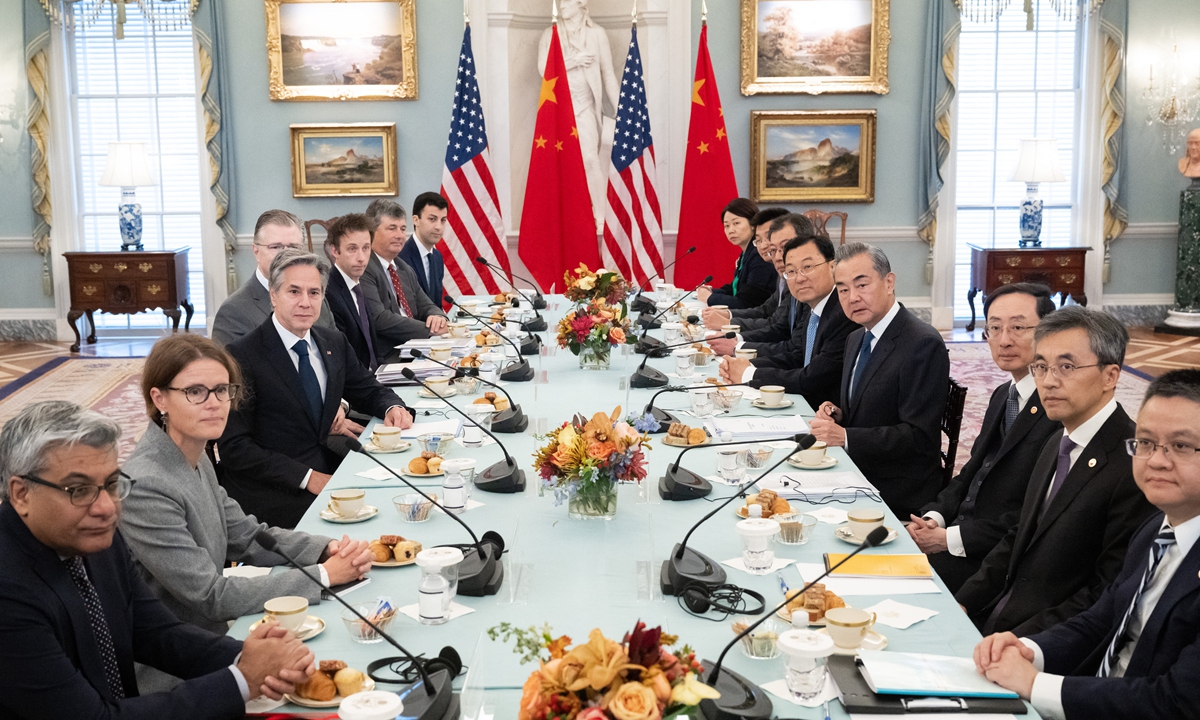(来源:《环球时报》(Global Times),2023年10月27日)

US Secretary of State Antony Blinken (center left) and Chinese Foreign Minister Wang Yi (center right) look on during a meeting at the US Department of State in Washington DC, on October 27, 2023. Photo: AFP
Collaborative efforts have been called for to improve China-US relations as Chinese top diplomat Wang Yi stressed during his three-day visit to the US that the two countries should work to return their relations to the track of healthy, stable, and sustainable development as soon as possible. Analysts said that Wang's visit had a pragmatic purpose and will continue recent frequent engagements between China and the US, and also pave the way for higher-level talks amid anticipation for stable China-US relations.
They noted that the current interactions can be seen as a positive signal for China-US relations, but the US' China policy has not changed and it will continue to contain China, as evidenced by the US' latest hype about a Chinese fighter jet intercepting US military aircraft in the South China Sea. China-US relations will be characterized by dialogue and tensions in parallel, they added.
Wang Yi, member of the Political Bureau of the Communist Party of China Central Committee and Chinese Foreign Minister, held talks with US Secretary of State Antony Blinken in Washington on Thursday, the first day of his three-day visit in the US. Before the meeting, Wang briefly appeared in front of the press together with Blinken.
Wang said that China and the US have had disagreements and differences, but at the same time share important common interests and face common challenges, which is why they need to have a dialogue.
Wang told reporters that China-US dialogue should not only be resumed, but should also be in-depth and comprehensive so that the two sides can increase mutual understanding, reduce misunderstandings and misjudgments, constantly seek to expand common ground and pursue mutually beneficial cooperation. Such efforts will help stabilize China-US relations and facilitate the return of bilateral relations to the track of healthy, stable, and sustainable development.
Wang's visit to the US reciprocates Blinken's China visit in June. This is the most recent high-level interaction between China and the US, and there are widespread expectations that the relationship between the two largest economies in the world will not be trapped in a downward spiral.
A release from the Chinese Foreign Ministry on Friday said that the two sides had an in-depth exchange of views on China-US relations and issues of common concern in a constructive atmosphere, and they would continue their dialogue on Friday morning (local time).
Although an immediate meeting upon arrival is not a typical diplomatic arrangement, analysts noted that recent rounds of senior official talks between China and the US have frequently included such arrangements and lengthy meetings, indicating that a slew of issues still need to be discussed between the two countries.
The successive meetings between Wang and US senior officials also highlight the pragmatic purpose of Wang's visit, promoting a solution to problems that have trapped bilateral relations and discussing details for higher-level meetings and even talks between top leaders, Li Haidong, a professor at the China Foreign Affairs University, told the Global Times.
According to US media, Wang is expected to meet US National Security Adviser Jake Sullivan on Friday, and is also expected to speak with Biden during his visit to the White House. There has been no confirmation from the Chinese side as of press time on Friday.
The arrangement of Biden and Wang's possible meeting demonstrates how much importance the Biden administration attaches to Wang's visit, and the topics Biden may bring up with Wang could include bilateral relations and climate change. Wang's meetings with Blinken and other US officials will be on more specific details, Li said.
Before Wang's arrival, Blinken was cited by some media as saying that he would work with Wang to rein in tensions in the Middle East. The Biden administration's priorities with Beijing include preventing intense competition and disagreements on a host of issues - including trade, the Taiwan question and the South China Sea, media reported.
The US has more expectations of Wang's visit and is seeking to get China's support on some issues of global concern. The US currently feels flat-footed on its global strategy, as the Russia-Ukraine conflict is challenging its strength and the Palestinian-Israeli conflict is burning its conscience, Lü Xiang, research fellow at the Chinese Academy of Social Sciences, told the Global Times on Monday.
Moreover, the Biden administration is eager to promote a meeting between the top leaders of China and the US. But it is not doing enough to promote pragmatic improvement of bilateral relations and needs to take concrete actions to promote solving problems in different fields, for example on trade and tariffs.
Dialogue goes with tensions
A series of interactions between Beijing and Washington have taken place over the past weeks, which has provided a window of opportunity for the two countries to stabilize ties that have been spiraling downward. For example, China arranged a high-level reception for California Governor Gavin Newsom and China and the US held the first meeting of the Financial Working Group on Wednesday, a move that is believed to have delivered outcomes by increasing pragmatic engagement.
Due to the recent frequent exchanges in various fields of different levels, there are also more diverse opinions about China policy within the US, including whether emphasizing competition with China is beneficial for the US, how the US should handle the Taiwan question, and whether it will be counterproductive to stifle China's technological advancements, Zhang Jiadong, a professor at the Center for American Studies, Fudan University, told the Global Times.
There won't be any significant changes between China and the US in the foreseeable future, and dialogue and exchanges will generally increase - this is a good signal as the relationship has stabilized since engagement resumed. However, relations between China and the US will not return to how they were in the past, as the basic policy of the Biden administration toward China has not changed, Zhang said.
China is still seen as the primary strategic competitor, and the US' China policy focus remains on containment and suppression, said Zhang.
For example, on Thursday, the US Indo-Pacific Command claimed that a Chinese fighter jet executed an unsafe intercept of a US Air Force B-52 aircraft over the South China Sea this week, according to US media.
To show the truth of the US' close-in reconnaissance at China's doorstep, the Chinese Ministry of National Defense has published videos several times to show that the US is the provoker and trouble maker.
Zhang noted that the disclosure of the interception indicates that neither China nor the US wants to give ground in exchange for dialogue and collaboration. In the past, they may have shied away from disputes temporarily in order to maintain a cordial dialogue climate. But these days, both parties are managing bilateral relations while concurrently engaging in competition and collaboration, and both of them are getting used to the pattern.
The US is not truly concerned about improving the China-US relationship, but rather creating a favorable atmosphere for the APEC meeting and maintaining stability in relations in the current stage of the bilateral relationship for its own political purposes, said analysts.
US policies toward China remain unchanged, and it continues to put pressure on China from different directions, said Zhang, noting that as for how far the China-US relationship can be restored through dialogue, it will require more time for the two sides to adjust, engage and argue, which may even involve conflicts.






